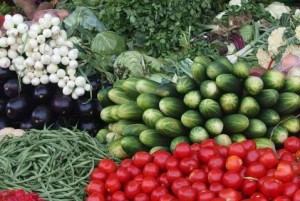CABI and MoFA initiate project to salvage horticulture industry
 The Centre for Agriculture and Bioscience International, (CABI) and the Ministry of Food and Agriculture (MoFA) have launched a four-year initiative aimed at salvaging the dying horticulture industry in Ghana.
The Centre for Agriculture and Bioscience International, (CABI) and the Ministry of Food and Agriculture (MoFA) have launched a four-year initiative aimed at salvaging the dying horticulture industry in Ghana.
The project, which is being sponsored with a 50 per cent grant from the Netherlands Ministry of Foreign Affairs, through its Facility for Sustainable Entrepreneurship and Food Security (FDOV), and another 50 per cent from Public-Private Partnerships (PPP) support, is to help address the frequent interceptions of harmful organisms on fruits and vegetables exported to the European Union from Ghana.
The project also seeks to work towards increasing horticulture exports through phytosanitary system development, knowledge sharing and infrastructure development, compliance with international standards and attraction of financial intermediation for the chain actors.
The Plant Protection and Regulatory Services Division (PPRSD) of MoFA, is to work with CABI-led PPPs, to strengthen the enforcement of government regulations and enhance technical expertise through extensive knowledge sharing on food safety and phytosanitary standards, proper use of agricultural inputs like seeds and pesticides, and agricultural practices and business conduct.
Ghana’s horticulture industry that was highly well-regarded for its increased high exports has in recent times, specifically, between 2014 and 2015 been facing challenges of safety standards, with the EU banning most of the vegetable and fruit exports to its market.
For instance, on September 19 this year, the EU voted for an import suspension, involving certain horticultural products from Ghana following repeated interceptions of exports with harmful organisms.
The products concerned are Capsicum (peppers), Lagenarian, Luffa, Momordica, which are gourds and Solanum species including aubergine.
The most common harmful organisms intercepted included fruit flies, whitefly, false coding moths and egg-plant borers.
This suspension is provisionally due to apply until December 31, 2016, but could be reviewed in light of development.
At the launch of the “Strengthening Horticulture Supply Chains and Improving rural Livelihoods” project on Friday in Accra, Dr Victor Clottey, CABI Regional Coordinator for West Africa said farmers who form an important part of the project, would be helped to meet standards through training in good agricultural practices and affordable integrated pest management principles.
He said: “This will be a careful way of changing how we produce, harvest, handle and trade our agricultural commodities. There may be challenges, but they are worth tackling in order to strengthen all segments of our value chain”.
Mr Thierry van Hilden, First Secretary of Netherlands Embassy described the project as a demand-driven project, which will ensure that the horticulture sector in Ghana is well improved and sustained for both local and international markets.
Mrs Milly Kyofa-Boamah, Director of the Plant Protection and Regulatory Services Division of the MoFA said the government was much concerned about the increasing number of notifications on horticulture produce and therefore welcomes the CABI-led collaborations with major stakeholders in finding lasting solutions to the problem.
She said a lot of programmes and activities were being put in place already to help address the situation and plans were far advanced in putting up a modern plant health diagnostic laboratory at Pokuase and another modern inspection facility at the Kotoka International Airport to ensure approved standards of horticulture produce.
Mr Jospeh K. Boamah, Chief Director of MoFA said because vegetable production and marketing provides excellent source of employment for both rural and urban households, such bans threaten a wide range of livelihoods.
“This is why at the policy level, we at the Ministry of Food and Agriculture, through PPRSD are committed to using sanitary and phytosanitary mechanisms to solve this problem facing the vegetable subsector and indeed all other value chains to assure improved trade relationships within and outside Ghana”, he said.
Mrs Julian Opuni, President of the Ghana Association of Vegetable Exporters (GAVEX) welcomed the initiative and pledged the support of her Association in helping find solutions to the challenges.
“The corrective measures and processes must start from farm to fork. All stakeholders along the value chain must become responsible to the challenges of eradicating pest and diseases, improved post-harvest treatments, logistics, local and air or sea transport, official documentations and cargo handling at the ports, control and inspections by PPRSD of products, airline bookings and any other factors”, she said.
Source: GNA
